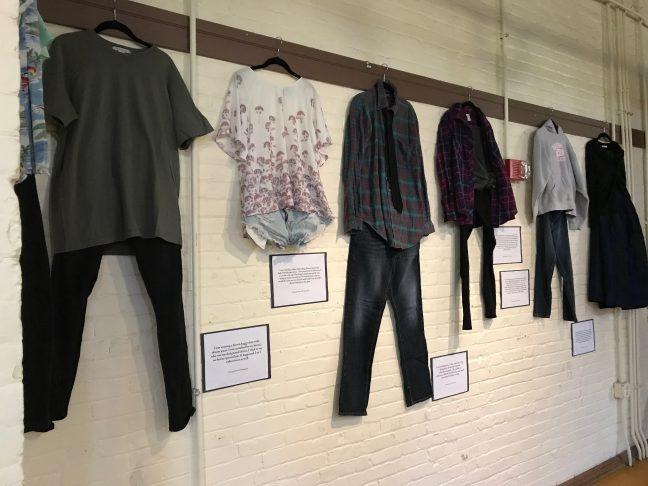Being sick is no treat. Ask anyone on campus; they should be well aware this time of year if ever. Usually the only consolation of having a cold or the flu is knowing that with enough sleep and soup the illness will likely pass in a few days.
Imagine having symptoms that didn’t pass; being ill with abdominal cramps, diarrhea, constipation, vomiting and fatigue for months, even years, without knowing the cause. This story sounds like a nightmare, but it is in fact a common reality for people suffering from celiac disease, many of whom don’t know they have it.
Celiac disease, or CD, is characterized by an autoimmune response to the protein gluten causing damage to villi in the small intestine, as explained by the Celiac Sprue Association. These villi are responsible for absorbing vital nutrients into the body, so it goes without saying that your health depends on those tiny little hairs.
When Center for Leadership and Involvement Coordinator Barb Kautz was diagnosed with CD this summer, psychological relief came quickly from the knowledge of what was causing her symptoms. Physical relief soon followed. After months of unexplained illness, it was hard for her to believe that within three days of a gluten-free diet she was entirely back to normal.
For other sufferers like UW junior Christy Dimond, full recovery is a longer process. Dimond, who happened to be interning for Kautz, was also diagnosed with CD this summer. She says that even after switching to a completely gluten-free diet she still has not fully recovered and continues to experience symptoms from time to time, although not as severe.
No matter how quick the recovery process is for an individual diagnosed with CD, the lifestyle changes required by someone who is a gluten intolerant take major adjustments. Gluten is a common protein found in wheat, rye and barley, and anything containing those. This immediately eliminates breads and pastas from the edible menu.
CD also disallows use of certain brands of non-food products including lipsticks and shampoos. Beyond the obvious gluten-containing products, the protein is used frequently in small amounts for filler in processed food products. Even supposedly gluten-free food could have had its packaging come into contact with gluten sources at some point during production.
Beyond the direct gluten sources, Kautz and Dimond are eager to note the dangers of cross-contamination, a particularly dangerous problem in restaurants that don’t completely recognize the severity of a gluten intolerance.
For anyone with celiac disease, a touch of gluten is all it takes. This can come from something as seemingly minor as using the same cutting surface or not changing rubber gloves when preparing a gluten-free dish.
“For some people who have a mild intolerance to gluten, it’s not that eating a tiny bit is going to make them incredibly sick right away. But if they keep eating it they can be at higher risk for cancers like lymphoma down the line,” Kautz said.
Unsurprisingly, Kautz and Dimond found support through one another and noted that it helps to be in touch with others going through the same struggle. They provide one another with support while sharing their own techniques for living a gluten-free lifestyle.
“It works great because sometimes shampoos and products that say ‘gluten-free’ on the label actually came into contact with a gluten source at some time,” Kautz said. “So to be able to have someone recommend one and say ‘this works for me’ is really helpful.”
The benefits of having people with a common story are tremendous, which is why the two have taken up the cause for celiac disease here on campus by creating a student organization they call Gluten-Free Badgers. They encourage anyone suffering from celiac disease or otherwise restricted to a gluten-free diet to attend their next meeting, which will be held Nov. 16 from 6-7 p.m. in the Media Room at the Red Gym.
The organization hopes to provide a forum for affected students to share their advice and experience with CD just like Kautz and Dimond were able to do, on a larger scale. In addition, they hope to spread awareness of the disease in the Madison community. This goes toward the ends of achieving larger (or any) gluten-free menus in restaurants as well as toward informing people about CD who might not know they have it. The numbers on campus are probably much larger than anyone knows. According to the University of Chicago Celiac Disease Center, the number of undiagnosed celiacs falls at a whopping 97 percent.
Other community service goals involve running a gluten-free food drive for local food pantries in need. Think about it, the typical food items someone would donate (pastas, cereals, canned foods, etc.) are out of the question for someone with CD. For now, however, they are in the process of finding more members. The first Gluten-Free Badgers meeting was only last month, after all.
If you or someone you know has, or even thinks he or she may have, gluten intolerance or celiac disease, Gluten-Free Badgers are welcoming all to join and help spread the word about a largely unheard of disease. You’ll undoubtedly pick up some tasty recipes along the way, and Thanksgiving is right around the corner.
For more information about Gluten-Free Badgers contact Barb Kautz ([email protected]) or Christy Dimond ([email protected]).



















